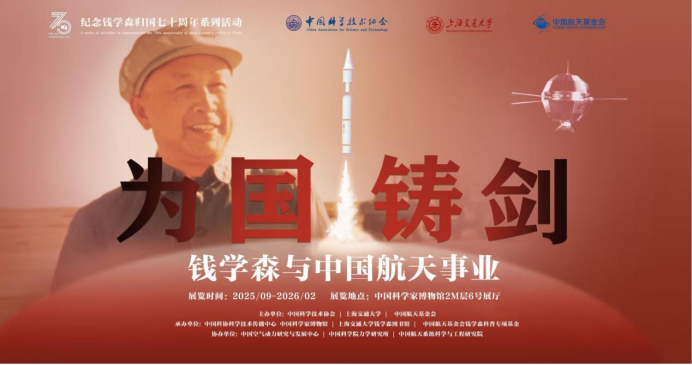CSM Unveils Exhibition Marking Qian Xuesen's 1955 Homecoming and 30 Years of Aerospace Education Programs

Beijing, Sept 17—The China Scientists Museum (CSM) honored the legacy of China’s aerospace pioneer Qian Xuesen on Wednesday, opening an exhibition and a series of ceremonies to mark the 70th anniversary of the scientist’s return from the U.S. and 30 years of the nation’s aerospace education programs.
Qian, who died in 2009 at 98, is widely regarded as the founding father of China’s aerospace programs. On 17 September 1955 he boarded the Steam Ship President Cleveland with his wife and two young children, defying U.S. travel restrictions imposed during the McCarthy era, and arrived in China weeks later to begin work on what would become the country’s first ballistic missiles, satellites and crewed-space plans.
The exhibition “Qian Xuesen and China’s Aerospace Cause” displays more than 70 photographs and 80 artefacts on loan from Shanghai Jiao Tong University’s Qian Xuesen Library & Museum, including a hand cranked calculator once used to crunch ballistic data in the early days of China’s aerospace program.
Six sections of the exhibition chronicle Qian’s role in drafting China’s 12-year aerospace plan in 1956, the “eight-year, four-missile” sprint that produced the DF-2, DF-3, DF-4 and DF-5 missiles, the 1966 live-nuclear warhead test at Lop Nor in Xinjiang, early regional aerospace defense system programs, the birth of China’s first satellite, Dongfanghong-1, which was launched in 1970, and Qian’s systematic engineering methodology.
Officials attending the opening ceremony included Feng Shenhong, Vice President of the China Association for Science and Technology (CAST), Bian Zhigang, Deputy Head of the State Administration of Science, Technology and Industry for National Defense, and Yang Zhenbin, Party Secretary of Shanghai Jiao Tong University.
Qian’s son, Qian Yonggang, who curates Qian Xuesen Library & Museum in Shanghai, recalled a father who never let us forget that science serves the nation and the people.
Veteran astronaut Fei Junlong, who commanded the Shenzhou-6 mission in 2005, and Liu Jiuliang, principal of an experimental primary school in remote Ningqiang county, Shaanxi province, who runs one of the Qian Xuesen Reading Rooms donated by the China Space Foundation (CSF) shared their views respectively.
The ceremony also doubled as the 30th anniversary of the China’s aerospace education programs.
The CSM, located at No. 3 Beichen East Road, a few blocks from Beijing’s Olympic Park, is the first national museum dedicated to modern Chinese scientists, bringing their life stories and scientific spirit to life. Visitors are welcome—reserve your timed slot online and step right in.
Tag: National Communication Center for Science and Technology, CAST
